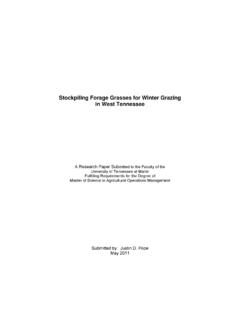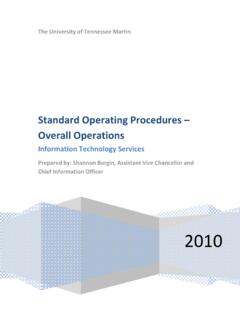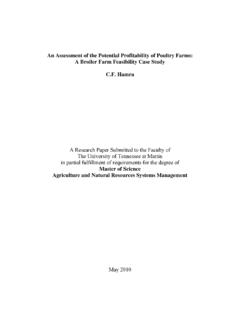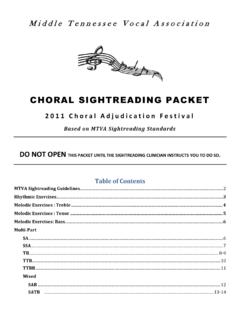Transcription of Knowledge and Attitudes of Tennessee Agriculture …
1 Knowledge and Attitudes of Tennessee Agriculture education Teachers on biotechnology Issues A Research Project to Fulfill Requirements for the Master of Science Degree in Agriculture and Natural Resources Systems Management The University of Tennessee , Martin Submitted by: Benjamin S. Rudy July 2009ii Information Name: Benjamin S. Rudy Date of Degree: August 7, 2009 Institution: The University of Tennessee at Martin Major Field: Agriculture and Natural Resource Management Concentration: Agricultural education and Leadership Major Professor: Dr. Timothy N. Burcham Title of Study: Knowledge and Attitudes of Tennessee Agriculture education Teachers on biotechnology Issues Pages Contained in Study: 31 Candidate for the Degree: Master of Science iii Acknowledgements I would like to thank Dr. Jimmy Butler, Dr.
2 Timothy N. Burcham, Dr. Barbara Darroch, and Dr. Philip Smartt for their assistance with completion of my graduate coursework and this research project. iv Abstract A survey to evaluate Tennessee Agricultural education teacher s Knowledge and Attitudes concerning biotechnology issues was developed and deployed in May 2009 (UT Martin IRB: 09-1-01-E05-4005). Participation in the survey was voluntary. Of 300 surveys deployed, 78 were completed, resulting in a 26% response rate. Tennessee agricultural education teachers were generally knowledgeable of biotechnology issues. Typically respondents were most familiar with biotechnology issues associated with traditional Agriculture , such as animal reproduction, hybridization, and herbicide resistant plant species, but had some Knowledge in the other areas. They were generally least comfortable with biotechnology -related areas such as electrophoresis and bioremediation.
3 The Tennessee agricultural education teachers agreed it is their responsibility to: (1) develop teaching plans associated with biotechnology and (2) involve students in Supervised Agricultural Experiences that teach their students about biotechnology There was a variation of opinions on responsibilities associated with: education of farmers, policy makers, and consumers; development and distribution of biotechnology materials; and biotechnology research. They did not favor developing publications on biotechnology . They were generally supportive of the use of biotechnologies in Agriculture and agreed that biotechnology related issues had a place in the classroom. Overall support indicated biotechnology issues are being discussed in the Tennessee agricultural education classrooms. v Table of Contents CHAPTER I - Introduction and General Statement of the CHAPTER II - Review of the Research Present CHAPTER III - Materials and Experimental Demographics of Level of biotechnology Issue biotechnology Issues and Responsibilities of Agricultural education Teachers5 Agricultural education teacher s Attitudes toward CHAPTER IV - Results and Level of biotechnology Issue biotechnology Issues and Responsibilities of Agricultural education Teachers7 Table 1.
4 Agricultural education Teachers Knowledge of biotechnology Issues. 7 Table 2. Agricultural education Teachers Responses to: It is the job of agricultural education teacher ..10 Agricultural education teacher s Attitudes toward CHAPTER V - Conclusions and Table 3. Agricultural education Teachers Attitudes toward biotechnology Issues. 14 APPENDIX APPENDIX Level of biotechnology Issue biotechnology Issues and Responsibilities of Agricultural education Teachers23 Agricultural education teacher s Attitudes toward Page 1 CHAPTER I - Introduction and General Information Introduction This research project was developed to document the Knowledge and Attitudes of Tennessee s agricultural education teachers on biotechnology issues. Within the Tennessee educational system there has been a push to introduce new science technologies into the agricultural classroom.
5 Tennessee currently offers an Agriscience course that can be applied as either a Career and Technical education credit or lab science credit. This survey will provide insight regarding agricultural education teachers present Knowledge of biotechnology issues and their Attitudes towards teaching this subject in the classroom. Statement of the Problem This survey will document the present Knowledge and Attitudes of Tennessee agricultural education teachers on biotechnology issues. Page 2 CHAPTER II - Review of the Literature biotechnology has become a commonplace topic in the media with the globalization of agricultural markets and the medical industry. With additional media coverage surrounding development of new methods of managing and manipulating living organisms using biotechnology , the potential for debate exists. In some instances, the debate may be centered on basic misconceptions about the science associated with a specific technology.
6 Literature on biotechnology in high schools and Agriculture classrooms shows support for biotechnology education in both high school science and Agriculture classes (Ahmed, 1996; Harms, 2002; Boone et al., 2006). A study of West Virginia agricultural education teachers found that most of the teachers lacked applied Knowledge in biotechnology , but supported the importance and benefits of biotechnology being integrated into the agricultural curriculum (Boone et al., 2006). An article by Ute Harms from the University of Munich states: It is the responsibility of science classes to inform the students of scientific and technical aspects of biotechnology and give them the tools to make sound decisions in the future about the risks and benefits of biotechnology (Harms, 2002). The West Virginia study of agricultural educators indicated that with more training in biotechnology areas, teachers would have been more comfortable introducing and discussing these issues in the classroom.
7 Agriscience is a curriculum that fuses Agriculture and science together by introducing the student to both areas simultaneously. Agriscience includes aquaculture, agricultural engineering, animal science technology, crop science, soil science, biotechnology , integrated pest management, organic foods, water resources, and environmental management (Cooper and Burton, 2002). Development of the Tennessee Agriscience curriculum started in 1987. Agriscience, as a component of Tennessee agricultural education , was approved in 1989 Page 3 for either Career and Technical education credit or lab science credit (Ricketts and Ricketts, 2002). Research Questions 1. What are the Attitudes of Tennessee agricultural teachers toward biotechnology ? 2. What level of Knowledge and understanding is demonstrated by Tennessee agricultural teachers regarding biotechnology ?
8 3. Do Tennessee agricultural education teachers with advanced degrees have more Knowledge about biotechnology issues? Present Study A review of West Virginia Agriculture educators found that agricultural educators lacked fundamental applied biotechnology Knowledge , but agreed that it was important for agricultural education curriculums (Boone et al., 2006). Therefore, this survey was developed to document the Attitudes and Knowledge of Tennessee agricultural education teachers at the high school level. Page 4 CHAPTER III - Materials and Methods Participants This study was sent to 300 agricultural education teachers in the state of Tennessee . Educational demographics of the population were determined during the survey. Instrument(s) The participants completed the survey through an email link that directs them to an Internet-based survey site ( ).
9 The survey was approved by the University of Tennessee at Martin s Institutional Review Board (IRB approval number: 9-1 01-E05-4005). The survey consisted of 50 questions/statements (Appendix A). The results for the survey were compiled and presented to the author in a spreadsheet format. Experimental Design A descriptive survey will be used to collect data from high school agricultural education teachers in Tennessee via an electronic survey ( ). The goal of this research is to document the present Tennessee agricultural education teachers Knowledge on biotechnology issues. The survey was designed (style, nomenclature, etc.) for the selected population of Tennessee agricultural education teachers. Procedures The participants were emailed a direct link to the web-based survey. The survey software compiles the information and sends results to the survey author via email.
10 Page 5 Demographics of Sample Three hundred surveys were sent to Tennessee agricultural education teachers throughout the state and 78 completed the survey for a 26% response rate. Of those that responded, the highest degree earned included 36 with a degree ( ), 26 with a degree ( ), one with a degree plus 30 hours ( ), six with a degree plus 45 hours ( ), four with a degree ( ), and one with a ( ). Level of biotechnology Issue Knowledge The survey included 20 Likert questions designed to explore the agricultural education teachers Knowledge on biotechnology issues. The response values were averaged for each question. A 4-point Likert scale was used for this portion of the survey: (1: No Knowledge ; 2: Heard about, but very little Knowledge ; 3: Read about, possess some Knowledge ; 4: Applied, Knowledgeable; Table 1). The Mode frequency value for each Knowledge area is demarcated in bold in Table 1.












